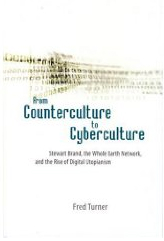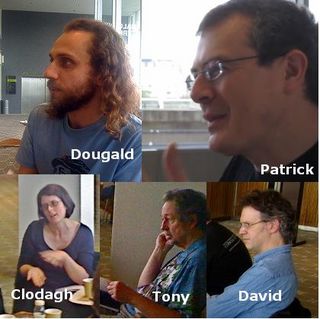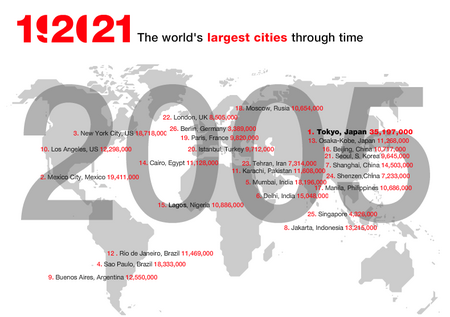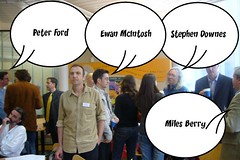18 November 02010
Resilience and scaling down in the face of decline (Dougald Hine discussion, part 2)
With hindsight, it was surprising that the first part of my discussion with Dougald Hine kept to a disciplined track for as long as it did. Perhaps it was the novelty of having the recorder turned on that kept the forces of entropy in check. But entropy will out.
On one level the discussion that follows has almost nothing to do with learning. On another, it has everything to do with learning. Part of the longer discussion we've been exploring concerns how you pull back the lens on your learning context, and what happens when you do? Do you develop a meta-awareness of your own learning process and a critical assessment of the systems in which it is embedded? Or is the meta-level not higher, but just different. I'm not sure now whether the discussion is profoundly important or just by the bye.
But here we start talking about scaling down and becoming more self-reliant. To what degree is this a response to a perceived, or real, decline in the fabric of our lives and infrastucture of our society. (Remember, I kicked off this thread 15 months ago talking about learning in the context of "progressive austerity" — a term that has since lost whatever charm it might once have had).
A reminder that you can also read Dougald's own take on the same discussion, including an audio edit. Here we pick up the discussion where Dougald Hine has just been talking about the complacency of Higher Education in the face of a potential "scaling down" in the institutional infrastructure you need to organise rewarding learning relationships.
Tony Hall: Is there a name for the process of the scaling down? Because I am thinking of Illich again and Tools for Conviviality, which influenced me incredibly in terms of giving me the confidence to say the only tool I need to work with in education is my camera. And that is what I have always done — because everybody, more or less, has a camera. So you could just use that as your educational tool — you need nothing else in a way. Is that whole sense of "scaling down" is that a Dark Mountain thing, a Collapsonomics thing?
Dougald Hine (DH): The Collapsonomics stuff I have been writing recently deals with the sense that, in some significant ways, the middle class existence is being eroded. We are living through the immiseration of the bourgeoisie.
Continue reading "Resilience and scaling down in the face of decline (Dougald Hine discussion, part 2)"13 October 02009
Counterculture, Cyberculture and Innovation: the strange case of Stewart Brand
 A couple of years ago, at the end of this post on the crossover between Web 2.0 and anarchism, I wrote that I'd started reading Fred Turner's From Counterculture to Cyberculture: Stewart Brand, the Whole Earth Network and the Rise of Digital Utopianism
A couple of years ago, at the end of this post on the crossover between Web 2.0 and anarchism, I wrote that I'd started reading Fred Turner's From Counterculture to Cyberculture: Stewart Brand, the Whole Earth Network and the Rise of Digital Utopianism, and suggested I might be blogging about some of the ideas in it. Time passed; I soon forgot the ideas the book had triggered; things moved on. Then, when Nico Macdonald told me the book was up for discussion at his Innovation Reading Circle, that gave me a reason to re-engage with the book. Nico already had Joanne Jacobs lined up to give an introduction to the book, but kindly created a support slot for me to give a response to Joanne's critique. What follows is that response, plus some brief and partial notes of the discussion that followed at the Reading Circle last night.
It makes sense to read Joanne's review in full first. To try and summarise it in a nutshell, Joanne is saying that Turner's radically overstates the countercultural significance of Stewart Brand and his circle of tech-visionary associates — much of their work and ideas actually has more in common with the dominant culture than with anything genuinely subversive. And to summarise my response in a nutshell, I ask, "So what if they weren't and aren't revolutionaries? Does it take anything away from their importance?" Then I try and answer the So What question in my own way. That's enough prefacing; on with the show.
1 Counterculture? What counterculture?
1.1 Counter to what?
I'm not convinced that Fred Turner is making any claims for Brand and his associates as revolutionaries. The book is called "from Counterculture to Cyberculture" and its main narrative is one of how a bunch of ideas from the fringes of society became mainstream — through the agency or the catalyst of Brand and his eco-filofax of contacts. It's the same narrative of innovation — corporate enterprises being prepared to think out of the box to be creative and competitive — that has become orthodoxy in many circles not too far from here.
This idea of boundary objects that "both inhabit several intersecting social worlds and satisfy the informational requirements of each" has been around for a while, and I think Turner's application to Brand's story is at least plausible.
Continue reading "Counterculture, Cyberculture and Innovation: the strange case of Stewart Brand"12 September 02009
Reflections on Longplayer Live
 I wasn't going to blog about today's first live performance of Longplayer, since I go on about Longplayer fairly regularly already.
I wasn't going to blog about today's first live performance of Longplayer, since I go on about Longplayer fairly regularly already.
But Christian Payne recorded an Audioboo interview with me, and the combination of vanity with minimal effort created a path of very low resistance, so here we are. I refer a couple of times in the interview to Jem Finer, and should probably have explained that he is the composer of the 1,000-year composition, of which today's performance is a 1,000-minute excerpt — still playing as I write (until 1am British Summer Time, tomorrow). Many more Longplayer interviews, including one with Jem, on Audioboo; photos on Flickr; and the inevitable Twitter search with its very short time-horizon.
31 December 02008
Support Longplayer Live
 To the Trinity Buoy Wharf lighthouse today for the annual visit to the Longplayer 1,000 year composition by Jem Finer/Artangel. In 02006's post I commented that some of the things we had hoped might happen that year had not come to pass. In this year's photo, evidence that patience was rewarded on at least one count.
To the Trinity Buoy Wharf lighthouse today for the annual visit to the Longplayer 1,000 year composition by Jem Finer/Artangel. In 02006's post I commented that some of the things we had hoped might happen that year had not come to pass. In this year's photo, evidence that patience was rewarded on at least one count.
The guy in the photo will have his name engraved on bowl number 1.01 in next September's live performance of Longplayer, and I believe I was also the first person to sponsor a (different) bowl and reserve a ticket at the performance. Please consider doing the same via this page. While you're at it,if you're in or near London, you may also want to join the Long Now London meetup group — it's free. Wishing you all the best for 02009.
10 December 02007
Animating the future of population and cities
One of those happy synchronicities has alerted me to two different ways of presenting information information about population growth. And, to compound the coincidence, the same topic was raised in a discussion with David Puttnam that I attended in the same week as I discovered them.
First is this video, which was featured in the Long Now Foundation blog. The animation of population growth from year 00000 to 02020 (Common Era) runs from 0:45 through to 3:35. The quickening pulse rate is a bit hammy, especially as the visuals alone tell a pretty compelling story (hint: wait until the last few seconds).
A more recent treatment of the same situation, but projecting from 02000 to 02100, and focusing particularly on our biggest cities comes from the site 19.20.21. The basic premise and story here is that there will be 19 cities in the world with 20 million (or more) people in the 21st century.
Continue reading "Animating the future of population and cities"31 December 02006
Be patient, it's a longplayer
 Another year is over, and today I made what is becoming my annual visit to the Longplayer 'listening post' at Trinity Buoy Wharf lighthouse. It seemed busier than New Year's Eve last year. The picture on the left was taken at lunchtime in the listening post at the top of the lighthouse — it shows one of the speakers for the music, and outside the window is the River Thames.
Another year is over, and today I made what is becoming my annual visit to the Longplayer 'listening post' at Trinity Buoy Wharf lighthouse. It seemed busier than New Year's Eve last year. The picture on the left was taken at lunchtime in the listening post at the top of the lighthouse — it shows one of the speakers for the music, and outside the window is the River Thames.
Longplayer is a piece of music that plays, without repetition, for a thousand years. Today is the seventh anniversary of the beginning of its continuous performance. There is more about the work in my accounts of my 02003 and 02005 visits. And more photos in my Longplayer set on Flickr. Listen to Longplayer in real time, and please make a donation to keep it playing, if you can.
Lucy is not well, so we won't be going out tonight. Many of the things we had hoped would have come to fruition by the end of this year are still in progress or up in the air. Longplayer is a consoling reminder that a year is a short time and that there is much to be said for being still and patient. Happy New Year!
5 December 02006
Steven Johnson and Brian Eno at the ICA
Yesterday evening the ICA put on an event that was part book launch for Steven Johnson's new book, The Ghost Map (subtitle: A Street, an Epidemic and the Two Men Who Battled to Save Victorian London — these long 'pitch' subtitles are getting out of hand), and part first UK event for the Long Now Foundation. It was a similar kind of discussion to last year's Longplayer conversation.
As the sole non-US founder of the Long Now Foundation, Brian Eno started the discussion by outlining its short history. It was started ten years ago by ten people, including Stewart Brand and Danny Hillis (presumably the Board includes most if not all of the founders). The main aim is to 'dignify' long-term thinking. They have a set time frame of 10,000 years as the horizon for their projections. Projects include Long Bets, the Clock of the Long Now, and a series of talks in San Francisco available as a podcast.
Continue reading "Steven Johnson and Brian Eno at the ICA"3 June 02006
Blogging, learning, and going off at tangents
I start off questioning the value of blogging an event that you know in advance will be blogged to death from every side. Does it really help anyone to have multiple perspectives on one thing, when the inevitable inconsistencies between them may be confusing? And if there are six accounts already, what added value is there in a seventh?
And then the penny drops, and I realise how to answer my question: I'm not doing this just for your benefit, dear reader, I'm doing it for mine. It's a means of consolidating my reflections. I leave them on my doorstep, and if you pass by and find them interesting, so much the better. But I'm under no obligation. Did you think I was aiming to be 'customer-centred'? Pay me some money, become a customer, and I might be. Until then, if there's no value in this for you, well, you can have a refund. For blogs to have an authentic voice, people have to speak first as citizens, not try and fit what they say into customer/supplier roles.
All of which is a lengthy preamble to a few comments I wasn't expecting to make on yesterday's blog.ac.uk conference.
Continue reading "Blogging, learning, and going off at tangents"31 December 02005
6 down, 994 to go

 Here are a couple of pictures taken this afternoon at the Trinity Buoy Wharf lighthouse. It was six years ago today that Jem Finer's Longplayer composition started playing continuously, and it's planned to keep playing until 31 December 02999, when it will start to repeat from the beginning. I wrote more about Longplayer after my first visit in October 02003. By coincidence the Longplayer web site is hosted by Paul Makepeace, who also hosts this site, and it was good to see him at the lighthouse today — you can see him in the photo on the left.
Here are a couple of pictures taken this afternoon at the Trinity Buoy Wharf lighthouse. It was six years ago today that Jem Finer's Longplayer composition started playing continuously, and it's planned to keep playing until 31 December 02999, when it will start to repeat from the beginning. I wrote more about Longplayer after my first visit in October 02003. By coincidence the Longplayer web site is hosted by Paul Makepeace, who also hosts this site, and it was good to see him at the lighthouse today — you can see him in the photo on the left.
Longplayer still runs on an old iMac — here's a photo of that iMac, and here's my full set of Longplayer pictures. Please consider making a donation to Longplayer to help keep it running for the rest of the millennium. Happy New Year!
5 December 02005
Why birds, and neanderthals, sing
The 'music instinct' is far more ancient than previously suspected, and neanderthals and birds may have been jamming before they were talking. But why do humans and birds converge on the same acoustic and aesthetic choices and why do babies respond to musical sound?
… quoted from the blurb for the Play on: a journey into the mystery of song event at the Royal Institution last week. Here are my touched-up notes from it.
Continue reading "Why birds, and neanderthals, sing"9 June 02005
Slow walk for longplayer on summer solstice
I've written a few posts recently (1, 2) related to the Longplayer 1000-year-long piece of music, and here's one more, including a request for your credit card contribution.
On 21 June, Ohad Fishof will be doing a fundraising slow walk across London Bridge and back, a total distance of 563.8m. For a contribution of £5 you can enter your estimate of how long this will take him, and, if you're closest to the actual time, you win a free flight to Brisbane (from London, so may be of limited interest to any international readers). Enter via the Slow Walk web site. As far as I can tell — though don't blame me if this is wrong — you can work out the shortest and longest possible durations from the fact that the walk starts at 8am, entries are allowed until 1pm, Ohad is having a one-hour break at the half-way point, and you can join him for a celebratory drink on the terrace at the Old Thameside Inn at 6.30pm (these latter timings are taken from an email from Jem Finer, composer of Longplayer and member of the Longplayer Trust). Please have a go.
The Slow Walk site has some links to 'slow culture' and long-term thinking, to which I would add the slow sound system.
1 June 02005
Doris Lessing and Laurie Anderson: rough notes
Here are my notes of last week's Artangel Longplayer Conversation 2005, which I previewed a few weeks ago.
Michael Morris of Artangel introduced the event by saying that, after five years of Longplayer — just 995 to go — they're instituting conversations like this as an annual event.
Doris Lessing and Laurie Anderson hadn't met until earlier in the month, when Anderson arrived in London to prepare for her recent shows. They had clearly decided that they wanted the conversation to be spontaneous and unscripted, and the only prompt they used was a flipchart behind their chairs on which they'd written a series of loosely-associated topics that they thought might trigger interesting exchanges.
Continue reading "Doris Lessing and Laurie Anderson: rough notes"17 April 02005
Time and Timelessness: Laurie Anderson, Doris Lessing, Jem Finer
Alongside her performances at the Barbican next month, Laurie Anderson is participating in a public conversation with Doris Lessing on the theme of Time and Timelessness (26 May, at the Royal Institution). The blurb for the event proffers:
Since the year 2000, the lighthouse on Trinity Buoy Wharf in London's Docklands has been home to the continuing performance of Jem Finer's Longplayer, a 1000-year-long piece of music commissioned by Artangel [donate]. Impossible to listen to in a single lifetime, does this constitute timelessness? Or maybe its simply a way for us to think about more than just our own experience, as science has always done.Continue reading "Time and Timelessness: Laurie Anderson, Doris Lessing, Jem Finer"
10 April 02005
How many CDs are there in the world? Gracenote and metadata
At the end of last year, I tentatively made the prediction that "the catalogue of music recordings readily available in the northern hemisphere will continue to increase by 50% every five years until 02025 when it may start to plateau or saturate". But I can't test this prediction until I have some reliable measure of the catalogue and of how much of it is 'readily available'.
So far I'm drawing a blank even on the simple measure of how many CD titles have so far been issued. Last week Gracenote announced that their CDDB® database for music recognition has been used two billion times to identify CDs. They claim CDDB "contains the largest online database of music information in the world". As of today it has data for 3,598,785 CDs and 46,002,354 songs (note the iTunes Music Store has only 2.5% of these songs available).
Is CDDB a good measure of the total catalogue of CDs? I've heard reports of up to 5% of CDs not being recognised by CDDB — though the only time I've experienced this was with a spoken word CD — which would suggest that CDDB underestimates the total catalogue. However, it also overestimates the number of CDs because the database contains several duplicate entries. I have the six CDs of the Anthology of American Folk Music, edited by Harry Smith on my iPod, with metadata taken from the CDDB. But two of the six CDs appear twice in the database, and one appears three times. You can see this by going to the web interface for the database, and searching on 'Anthology of American Folk Music' (n.b. a fourth volume was released separately from the original three-volume, six-CD set). Try it for other albums as well.
Continue reading "How many CDs are there in the world? Gracenote and metadata"31 December 02004
Long bets
Reading Martin Rees's book Our Final Century — an analysis of a range of natural and man-made risks that may threaten our existence in the next hundred years — led me to discover the Long Bets web site.
The foundation that runs this site aims to use long bets to encourage long-term thinking (see this earlier posting on long-term thinking and this one). The idea is to encourage people to be accountable for making long-term predictions about our future, and ideally to put their money where their mouth is by making a bet that it will come true. If they win the bet, they don't get the money — it goes to a charity they nominate — but they get kudos. Here's a Wired News feature on long bets.
Continue reading "Long bets"28 January 02004
Brains, culture, then what?
I'm interested in long-term thinking, seriously long term (see this posting and this one). So one passage in Stephen Oppenheimer's October 2003 article in Prospect captured my attention and triggered a further question.
Oppenheimer suggests that cultural evolution has outstripped genetic evolution for last 300,000 years. Our species develops by accumulating and transmitting knowledge down the generations rather than growing bigger brains. Brain growth stopped 300,000 years ago, and went into minor decline. Oppenheimer makes a speculative analogy with the growth in car engines: beyond a certain point the economics of further engine growth meant that costs outweighed benefits; and perhaps it was the same with brain growth?
My question is: what happens when the costs of further knowledge accumulation outweigh the benefits? Where do we look for the next form of evolution?
Continue reading "Brains, culture, then what?"11 October 02003
Eno on the Long Now
For one week from the time of this posting you can hear an interview with Brian Eno in which he discusses the Long Now Foundation (as discussed here a few days ago), and his exploration of bell sounds as 'demonstrations' for the 10,000 year clock project. (Don't be put off if the radio stream starts with an arts review programme: the Eno interview starts about 27 minutes in and runs for 30 minutes.)
Eno again manages to make the ideas provocative and moving. With luck the interview should be archived after 17 October on the BBC Radio 3 Mixing It page — try clicking on the pull-down menu near the bottom of the page (at the time of writing).
7 October 02003
Longplayer: 1,000 Year Composition
 This picture was taken last Saturday, when I visited the Trinity Buoy Wharf lighthouse to see Jem Finer's Longplayer. Since then, the Longplayer web site has been overhauled, and the message about the funding of the project prompts me to explain why I think you should visit and/or donate funds, as I have done.
This picture was taken last Saturday, when I visited the Trinity Buoy Wharf lighthouse to see Jem Finer's Longplayer. Since then, the Longplayer web site has been overhauled, and the message about the funding of the project prompts me to explain why I think you should visit and/or donate funds, as I have done.
I first heard the idea of making music for 'the big here and the long now' from — you guessed it — Brian Eno. That phrase is intended to conjure a way of seeing ourselves beyond the confines of parochial concerns and short attention spans. Some of Eno's chums decided to do something about this, since cultural re-engineering is very much the bag of people like Stewart Brand and Bruce Sterling (you can just imagine the dinner party where this was conceived, can't you?), and they established the Long Now Foundation. You can spot a citizen of the Long Now by the way they write their dates, with a leading 0 on the year — as in 02003 — to remind us that the two millenia in what people like Julian Cope refer to as the 'Common Era' are just the blink of an eye in the big picture. I'd do this myself on this site if I could only work out how to hack the Movable Type code to do it! [Update: I eventually figured that out.]
Continue reading "Longplayer: 1,000 Year Composition"
Subscribe to my RSS feed, which covers this blog, my book blog, and further commentary on other web resources (more feeds below)
Counterculture, Cyberculture and Innovation: the strange case of Stewart Brand
Reflections on Longplayer Live
Support Longplayer Live
Animating the future of population and cities
Be patient, it's a longplayer
Steven Johnson and Brian Eno at the ICA
Blogging, learning, and going off at tangents
6 down, 994 to go
Why birds, and neanderthals, sing
Slow walk for longplayer on summer solstice
Doris Lessing and Laurie Anderson: rough notes
Time and Timelessness: Laurie Anderson, Doris Lessing, Jem Finer
How many CDs are there in the world? Gracenote and metadata
Long bets
Cinema (24)
Cultural Calendar (86)
Curatorial (66)
E-learning (102)
Events (35)
Future of Music (95)
Human-Computer Interaction (62)
Ideas and Essays (37)
Long Now (18)
Miscellany (44)
Music and Multimedia (157)
Playlists (27)
Podcasting (12)
Politics (12)
Radio (48)
Reviews (58)
Social Software (60)
Teaching (23)
Alternatively, see the Date-based Archives
Recommended: RSS feed that combines items on this site, my book blog, and commentary on other web resources
RSS feed for this site only
RSS feed for my book, Net, Blogs and Rock'n'Roll
RSS feed for shared bookmarks
My latest bookmarks (click 'read more' for commentary):
My archived bookmarks (02004-02008)
On most social sites I am either 'davidjennings' or 'djalchemi', for example: Flickr, Last.fm, Ma.gnolia and so on…
Lateral Action — managing creativity
Herd — social cognition
Seb Schmoller's e-learning mailings
Viridian Design Movement
Tom Phillips — artist
Long Now blog — resources for long-term thinking
Longplayer live stream — 1,000-year composition

The contents of this site are licensed under a Creative Commons Licence except where otherwise notified.
Hosted by Paul Makepeace
W3C Standards
Check whether this page is valid XHTML 1.0
Check whether the CSS (style sheet) is valid




